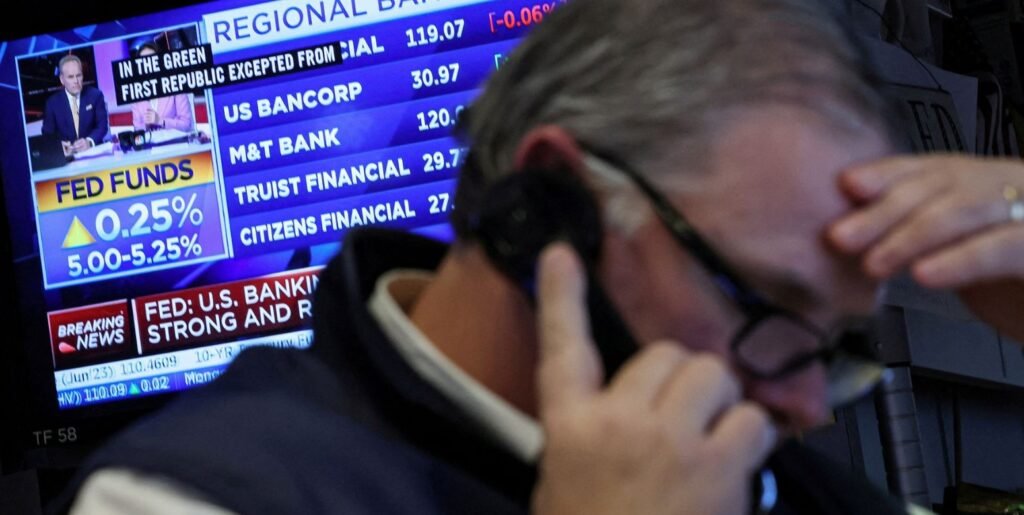The US stock market staged a dramatic comeback on Thursday, after a sharp selloff triggered by a higher-than-expected inflation reading. The S&P 500 index closed up 2.6%, recovering more than 40% of the losses over a six-day slump that took it to a two-year low. The Dow Jones Industrial Average and the Nasdaq Composite also rallied, gaining 2.4% and 3.1%, respectively.
The rebound came as investors speculated that the yearlong selloff had potentially reached a bottom, and that the Federal Reserve would act swiftly to curb inflation by raising interest rates. The market also shrugged off weak demand for a $20 billion auction of 30-year Treasury bonds, which sent the yield on the long-term debt soaring to 5.25%, the highest level since 2020.

Some analysts attributed the bounce to technical factors, such as programmed buying and short covering, as well as better-than-expected earnings from some companies. Delta Air Lines Inc., Domino’s Pizza Inc. and Walgreens Boots Alliance Inc. all reported results that beat analysts’ estimates, boosting their share prices.
The S&P 500 index closed up 2.6% on Thursday, recovering from a six-day slump triggered by inflation fears.
Core inflation hits 40-year high in September
The catalyst for the market turmoil was the release of the consumer price index (CPI) data for September, which showed that inflation remained elevated despite the Fed’s tightening measures. The CPI rose 0.4% last month, slightly above the consensus forecast of 0.3%. The annual inflation rate was 5.4%, unchanged from August and the highest since 2008.
However, the core CPI, which excludes food and energy costs, increased 0.3% last month, also above the expected 0.2%. The core inflation rate was 4.1%, the highest since 1982. Economists favor the core gauge as a better indicator of underlying inflation than the overall CPI, which can be distorted by volatile items such as gasoline and food prices.
The CPI data added to the evidence that inflation was not transitory, as the Fed had initially claimed, but persistent and widespread. The data also followed last week’s payrolls report, which showed that the unemployment rate fell to a five-decade low of 4.8% in September, indicating a tight labor market that could fuel wage pressures.
The core CPI rose 0.3% last month, pushing the annual core inflation rate to 4.1%, the highest since 1982.
Fed expected to deliver large rate hike in November
The inflation shock increased the odds of a large rate hike by the Fed at its next meeting in November, as well as further tightening in the following months. The market is now pricing in a 75 basis-point hike in November, followed by another one in December, according to swap contracts. The Fed funds rate is currently at 3.25%, after three hikes this year.
The market also expects the Fed to push rates past 4.85% before the end of its tightening cycle, implying at least six more hikes next year. The Fed’s own projections, released in September, showed that most officials expected one more hike this year and three more next year, taking the rate to 4%.
Some analysts said that the Fed’s credibility was at stake, as it had underestimated inflation and failed to act decisively to contain it. Others said that the Fed was facing a difficult trade-off between fighting inflation and supporting growth, especially amid uncertainty over fiscal policy and supply chain disruptions.
The market is pricing in a 75 basis-point hike by the Fed in November, followed by another one in December, to combat inflation.
Global stocks under pressure as US yields spike
The US inflation scare also rattled global markets, as higher US yields raised borrowing costs and reduced appetite for riskier assets. Asian stocks fell on Friday, following slight losses on Wall Street on Thursday after the CPI data. The Nikkei 225 index in Japan dropped 0.9%, while the Hang Seng index in Hong Kong slid 1.8%. The Shanghai Composite index in China bucked the trend, rising 0.6%, as investors awaited trade and inflation data from the world’s second-largest economy.
European stocks also opened lower on Friday, tracking the weakness in Asia and the US. The Stoxx Europe 600 index fell 0.7%, while the FTSE 100 index in London declined 0.8%. The DAX index in Germany and the CAC 40 index in France both lost 0.9%. Investors were also cautious ahead of key US data releases later in the day, including retail sales and consumer sentiment.
Global stocks fell on Friday, as higher US yields weighed on risk appetite and increased borrowing costs.
